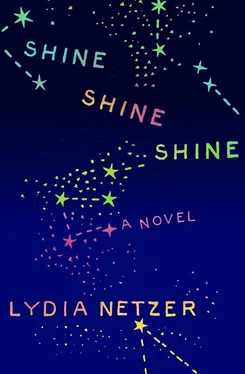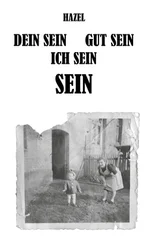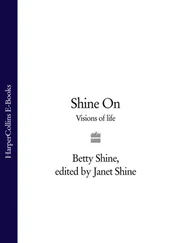* * *
ANOTHER MEMORY. THEY STOOD, linen bag and leather case in hand, in the square before the elaborate Sula Pagoda in Rangoon. Sunny could remember the shape of her mother’s face, it was so serene. The gold point of the shining pagoda rose up in the center of the building, layer on layer of gold getting smaller up to the very top. Around the central peak was a golden fence and there behind that fence, some people were congregating. The day was hot and Sunny was not well rested. She hung on her mother’s hand. She let her head fall back against the top of her shoulders, her neck going slack. At the very peak of the pagoda’s spire, there was an extra little hat shape and a beautiful star.
Her mother shifted her weight but did not lean on the white wall behind them. She stood straight. In the square, Sunny saw a woman with gold rings around her neck. The rings were stretching the neck to double its natural length, and on top of this great neck the woman’s head was wrinkled and flat. She saw the great white chinthes, sacred lion statues, with enormous teeth and their beards green. She saw brown babies carried on their mothers’ backs. She saw a man with one arm and half a leg where his whole leg should be. He was sitting on the ground. She saw hungry children gathered around a bag of trash outside a restaurant. Sunny was only three years old. Her mother had to help her remember, later, what things she saw, and what she knew. Some people were in rags, and some were draped in orange robes. Her mother held her hand. Then some people dressed in brown were hurled off the roof of the golden pagoda, over the golden fence. They dangled under the edge of the roof and swung back and forth, like they were dancing.
Sunny’s mother pulled her away and they began to walk toward the harbor. She asked her mother if they would see her father soon. Her mother said that they would never see her father again. Years later, in front of the Sula Pagoda, there would be a violent antigovernment uprising. Thousands of protesters would be silenced by bayonets in the face. When they had been killed, they would lie down in the street with broken skulls. The protest continued for months, until people began to wonder whether Burma had ever been a beautiful place. Pain was all around. In Burma, things never seemed to get any better. For Sunny and her mother, it was over. They were done with Burma and the Irrawaddy River. They were done with Buddhism and nats and monsoons. They boarded a boat with some other people going to America. They left the entire country of Burma behind.
In the end, the fate of Bob Butcher is murky. But his wife, at last, returned to America, where Sunny began her life as an American child.
In her mind, Sunny did not really accept that her father was dead. She did not learn that lesson of the dangling bodies. She believed in her heart that he had survived, and lived. Maybe he had never been put up there, swinging high from the pagoda. After all, no one had seen his face. Maybe he had stayed in the prison, escaping years later. He had wandered off into the jungle, confused, or more likely sad. To imagine him as a fugitive in this world was more pleasant than the alternative. There wasn’t really a great visual memory of him left, even right away after he died. Her memory at that time did not include details. But she knew of him, his broad outlines, the roaring energy around him. She liked to think of him as free, as a panther.
If her father was out there hunting the woods of Burma, looking for home, then she was not ever really alone on this earth. He might eventually work things out, and be coming for her. He might be ready to reach out to her at any time. In city traffic, in any passing car, he could be there turning his certain shape of face to the glass, seeking her out. Of course, he would also have his reasons for staying in the shadows. He would need to be cautious. After all, what had happened to him once might happen to him again. There could be consequences to human contact.
She was never able to identify his face in a passing vehicle. But this did not stop her from wondering if her face had captivated other people she saw, men of a fatherly age. She thought she might catch someone’s eye, someone who had never seen a face like hers before. The person might say, “Follow that girl, because I have to know where she lives.” Someone solid and distinguished might show up at the doorstep, fall in love with her mother, and become her new father. Maybe he would turn out to be the same old one after all, wearing a clever disguise. There were men, throughout her life, that were fatherlike. A man with gray hair. A professor who told her, The subject is not worth doing, if it’s not fucking full of memorizing right at the beginning. Everything worthy starts out that way.
The tragedy of her father’s absence had never actually been an acutely tragic event for her. As she grew up and came to understand the world, he was a part of it. An already dead part. His absence was the landscape of her family. Increasingly, as the years went on, she didn’t really know what she was missing, but that didn’t stop her from missing it. She fixated on him. She prayed to him. She attempted to research him, found obscure publications of his in scientific journals. The language was so formal, she could barely understand it. But she told herself, This is familiar. This is mine, bone of my bone, flesh of my flesh. She thought, There was a feeling he had, when he wrote this, when he was alive. He communicated it to me, even though everyone else who reads the article only gets a lot of information about this scientific test subject, and his reactions to all these oils. She dreamed her father was still out there, publishing under a pseudonym, more chemical properties of Burmese flora, the exquisite blooms of a jungle orchid coming to grips with his mortar and pestle.
Her belief that her father was still living did not stop her from telling stories about his death. She learned quickly when she started school that having a father who was killed by Communists immediately magnified her fame. Of course in her school she had already gained a certain notoriety from the mere fact of being bald.
In school, she would reference Bob Butcher in passing, and call him “My father who died” or “My father who was killed by Communists” or “My dead father.” There were other children in her middle school whose fathers were gone. There was one other child whose father was dead, of a heart attack, at age forty-five. That poor kid, having stood over his father’s grave, and cried with real tears and snot, was not able to translate this experience into any sort of social status, because he was always coming in with a little dairy farm on his brown shoes, and it didn’t matter to the other kids, whatever thing was festering in him. He could visit his father’s grave, and no one put their arm around him. But there was a lot of curiosity, about Sunny’s family in general, coming from the community. So eventually Sunny was asked, by one of the girls from Foxburg whose families still had money, to tell everyone exactly how her father died, anyway. “What’s the deal with your dad,” said this girl to Sunny. “How did he die anyway?”
Sunny, her social instinct strong even at the age of eleven, was able to deflect. Rather than giving up her mystery in the moment, she was wise enough to say, “Yes, I will tell you, but not today.” She chewed her gum cryptically, rolled her eyes, slammed her locker shut. Then she delivered a brilliant smile, and pushed off down the hall.
“I will tell you,” said Sunny when pressed again by this other local rich girl with a very severe ponytail and curls. “Next week at some point, probably, down by the track. During track practice. Meet me.”
Читать дальше









